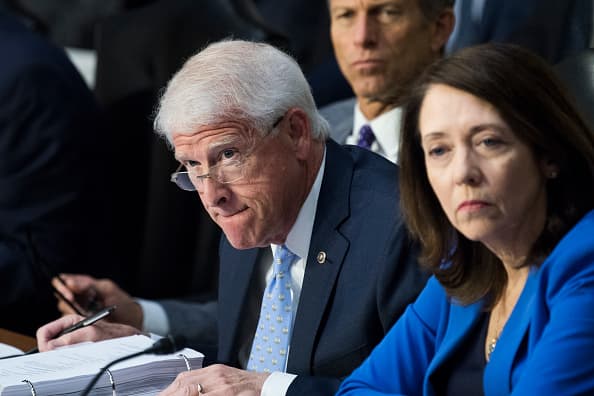Senate committee votes to subpoena CEOs of Facebook, Google and Twitter to testify

From left, Chairman Roger Wicker, R-Miss., Sen. John Thune, R-S.D., and ranking member Sen. Maria Cantwell, D-Wash., conduct a Senate Commerce, Science, and Transportation Committee markup in Hart Building on July 31, 2019.
Tom Williams | CQ-Roll Call, Inc. | Getty Images
The Senate Commerce Committee Thursday voted on a unanimous, bipartisan basis to subpoena the CEOs of Facebook, Google and Twitter to testify before the panel about concerns over the tech industry’s key legal shield, Section 230 of the Communications Decency Act.
Washington Sen. Maria Cantwell, the top Democrat on the committee, initially opposed the subpoena introduced by Chairman Roger Wicker, R-Miss. But on Thursday, Cantwell said she supported the move after Republicans included language in the subpoena about privacy and “media domination.”
Cantwell stressed, however, “what I don’t want to see is a chilling effect on individuals who are in a process of trying to crack down on hate speech or misinformation about Covid during a pandemic.”
“I welcome the debate about [Section] 230,” Cantwell said in her opening remarks. “I think it should be a long and thoughtful process. Not sure a long and thoughtful process will happen before the election, but I understand my colleagues’ desires here today.”
Republicans have repeatedly turned to Section 230 as a key area for reform in response to their concerns that social media companies like Facebook, Twitter and Google’s YouTube censor conservative voices. The platforms have repeatedly denied that they suppress conservative users, many of whom thrive in sharing their messages on those services. Still, several instances in which the platforms have made mistakes or reversed course on take-down decisions have fueled those criticisms from the right.
Section 230 allows online platforms to be protected from liability for their users’ posts and their moderation practices if taken in good faith. While the bill was introduced in the 1990s to allow nascent tech companies to grow, many lawmakers on both sides of the aisle have recently questioned its current language, which now serves to insulate some of the world’s most valuable companies from legal challenges.
“Even if you happen to agree with them on a particular issue right now, ceding the power to the star chamber of Silicon Valley is profoundly dangerous,” Sen. Ted Cruz, R-Texas., said following the committee’s vote.
This story is developing. Check back for updates.